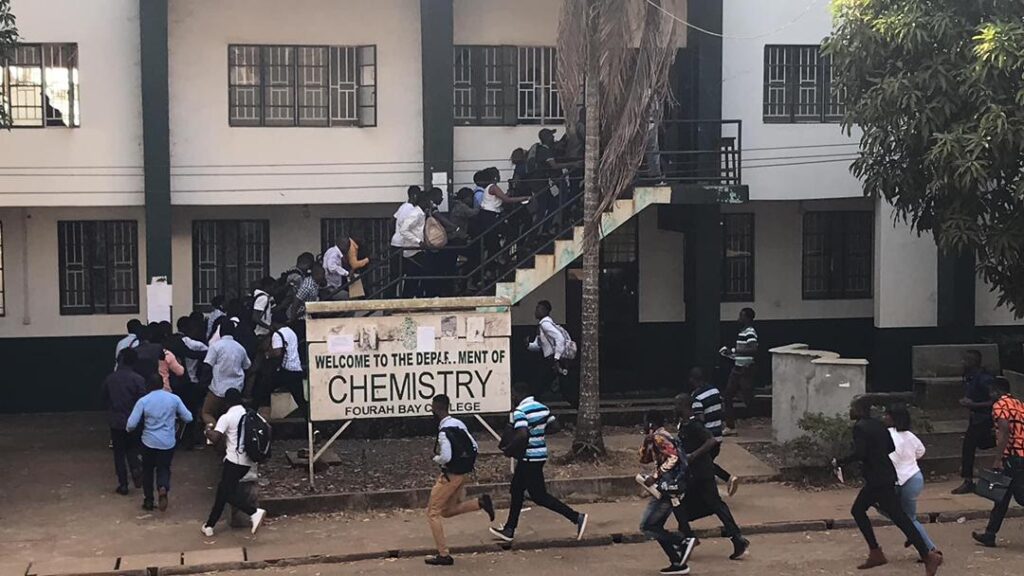When Dauda Kamara got admitted to study engineering at Fourah Bay College, he was over the moon–excited about being at Mount Aureol and hopeful about his future. A few weeks into his university journey, the euphoria started dissipating as he was struck by the reality of student life at Sub-saharan Africa’s oldest western-style university. Dauda finds himself fighting for everything–from a spot in class to a seat in a taxi.
Fourah Bay College is facing a serious overcrowding problem. The current student population, now about 7,000, far outweighs the available facilities–from lecture rooms and furniture to accommodation and transportation. The problem manifests itself in the chaos and scrambles that ensue when students compete for space in packed classrooms.
Only a month into the new semester and only Dauda’s first few weeks on what many still consider as the prestigious Mount Aureol campus, the freshman has been outrun and outmuscled time and again, as large numbers of students scramble to secure a seat in class.
“I was literally going to be squeezed to death while I was trying to get to class the other day”, Dauda told Engage Salone.
There are more than 500 new students in the first year of one of the engineering programmes. The college authorities have broken them into groups to try and reduce congestion and avoid the chaotic scenes that usually precede lectures. But the problem persists and as Dauda puts it, “it still does not guarantee any convenience”.
“If you don’t have the stamina, you won’t have a place to sit. I went to class that day feeling so bad.”
After the scramble, sometimes the lecturers do not show up.
“One day, a lecturer entered the hall and told us that he was not going to teach; he only came to take note of the attendance,” Dauda said, wearing a very disappointed look on his face.
The situation for Dauda and his fellow engineering students becomes even worse when they have to do workshops and practicals. Students who are not lucky to get a seat in front of the class do not hear what is being taught, he said.
The Faculty of Engineering used to have very low student numbers many years ago. And so was the Department of Law, which only admitted a small number of students a year, thanks to their very strict admission requirements. All of that has changed now as the problem cuts right across all the faculties.
Like Dauda, Theophillia Willaims is a first year student whose excitement has been watered down by the challenges of settling into Fourah Bay College. At the law department where she studies, there is always the risk of missing what lecturers say when you sit at the back. And you would always find yourself at the back if you do not show up very early to secure a good spot in the class.
Theophillia’s classmate, Victor Onie Willaims is not new on Mount Aureol. He has returned to the campus to study law after completing his sociology programme seven years ago. While he acknowledges that there has been a lot of development in infrastructure, he also notes that overcrowding has become a major problem. In fact, students have had to devise “self-help” ways of dealing with the problem.
“We contributed money, NLe 20 each, to buy a public address system for the lecturers to use so that students who sit at the back can hear them.”
There are about 400 students in Victor and Theopillia’s class and with that number, they still have a combined class with sociology students on Tuesdays. That doubles the number, Victor told Engage Salone.
The Mass Communication Department which did not have a history of overcrowding is now struggling too. According to some newly admitted students, they have been taking some of their classes in the hostel lounges, a place designed as a common facility for students living in the halls.
The problem has been developing over the years as student numbers increase without a corresponding development in infrastructure. Every year, more students are admitted and with pass rates at the senior secondary school leaving examination, WASSCE increasing, colleges and universities are forced to admit numbers that they cannot adequately cater for.

The authorities at Fourah Bay College acknowledge the problem with space on their Mount Aureol campus. James Tamba Lebbie, a spokesman at the University of Sierra Leone, which is the parent body of Fourah Bay College, described students’ concerns as “very legitimate and they have every right to complain”.
Lebbie told Engage Salone that many factors contribute to the overcrowding and bad student experience. “There has been a quantum leap in the enrollment of students,” he said.
“It would be unfair to many people, and by extension parents, whose children qualify to come to the university and they cannot be admitted to the college through no fault of theirs.”
“This year, we planned on running certificate and diploma programmes initially outside Freetown, but almost all the applicants preferred to study in the capital. We cannot impose anything on these students,” he said.
“The university is working on expansion and as I speak, construction has started around the amphitheatre where they are building additional classrooms.”
But he also argues that the problem is not only because of lack of space. He said some lecturers make changes to the initial timetable that the administration creates, disrupting the lecture arrangements.
“They do not stick to the timetable because they want to come, teach early and leave; and sometimes it is the students that ask lecturers to adjust the timetable,” he said.
“And when that happens”, he added, “there are bound to be clashes”.
According to Lebbie, it has been established that if lecturers go by the administration’s timetable, there would be little or no confusion and clashes. However, it is not only a matter of clashes. The available classrooms cannot accommodate the current student numbers, causing students to scramble for space.
The Students Union says they are also aware of the challenges. Student president, Alfred Micah Sesay said, “we do not deny that there are a series of problems and as a government, we advocate for students and engage constructively with the administration.”
“There are a lot of lecture rooms without furniture and even whiteboards, but we have been advocating and the administration has been working on these. Our mandate is to advocate which we do without hesitation and the administration has the mandate to provide these services”.
Spokesman James Tamba Lebbie told Engage Salone that the administration was taking steps to address the problems that students face but resource constraints are a barrier to addressing the problems as swiftly as they should have.
“Little steps are being taken, construction of new classrooms is ongoing, and we have set up the Alumni Endowment Fund which will hopefully enable the University to expand to match the increasing enrollment of students.”
He said the University was also working on introducing distance and e-learning options that allow students to attend classes without having to be on campus physically. “This will help to depopulate the campus,” Lebbie told Engage Salone.
This year has also seen an unprecedented shortage in accommodation on campus as student numbers balloon and many face uncertainty over room allocations. Second year student, Bintu Fofanah struggled to get a room this year and she had to pay way more than the regular amount to secure a room “reserved for postgraduate students”. That cost her a whopping NLe 2,500. According to Bintu, she was forced to pay the amount because she lives too far away and there was no way she could commute to class every day.
There have also been reports of female students moving into some of the male hostels because the female halls were already full in the first few weeks of the new academic year. Although the authorities did not admit this, many students we spoke to confirmed that female students have been assigned to rooms in the male hostels.
Student president, Alfred Sesay confirmed that female students have indeed been accommodated in the male halls due to a large number of applications for accommodation on campus.
“The female hostels became fully booked too quickly, leaving up to 250 female students without room, while some blocks in the male dormitories were shrill vacant. So, the female students were sent into the vacant blocks in the male hostels. Last year, we had them in Block H and this year they are in Blocks 33 and 34.”
One female student said it was one way of dealing with the issue of overcrowding, but it opens the door to so many other problems, adding that it is a desperate solution by the administration and they should be concerned about the safety and convenience of their female students.
Just as the problem transcends departments, so does it affect every aspect of life on Mount Aureol. Students do not only deal with the shortage of classroom spaces and accommodation, but they also have to struggle to get transportation to and from campus. The age-old problem remains and it is only getting worse, one student said.
For students like Dauda Kamara who do not stay on campus, their day usually ends with one last bout–to catch a taxi or bus home. And the journey home is not different from the one to campus the next day. It is an unpleasant routine where you have to wrestle every day. The quickest means to and from class are the motorbikes, but they are also the most expensive and dangerous–they can cost an arm and a leg, figuratively and literally.
Dauda’s first few weeks at Fourah Bay College came with a lot of disappointment. “I did not think I would have to run a race to have a seat in class and the fact that I have five years here scares me more,” he said.


